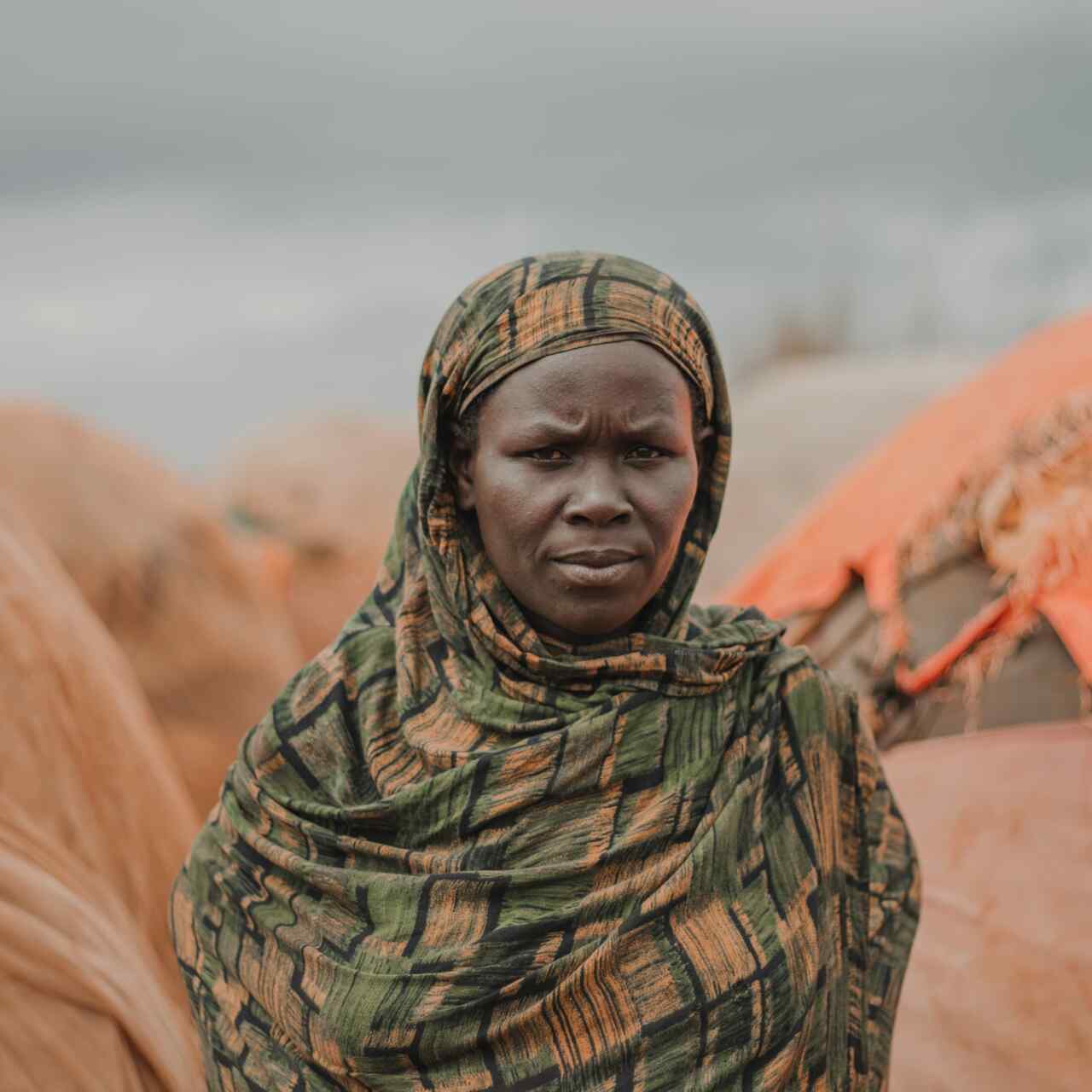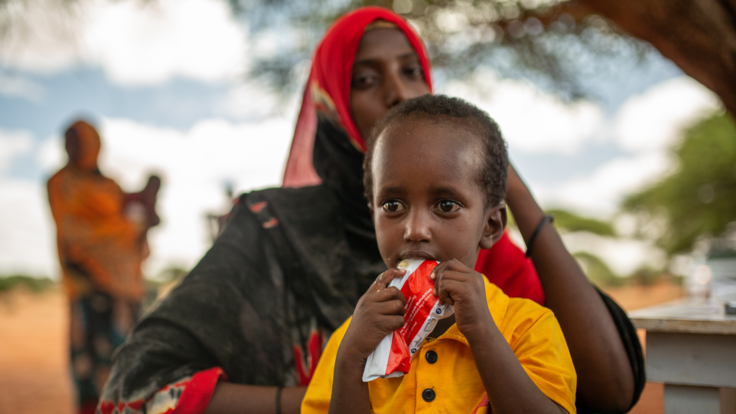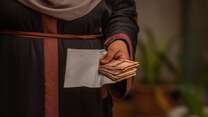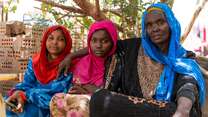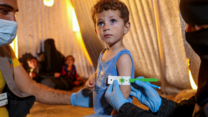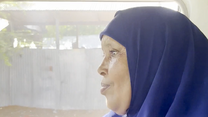Conflict and drought drive destabilization
- Al-Shabaab attacks surge, with 120+ incidents in 2024, sparking fears over security after the African Union’s withdrawal.
- Somalia’s recovery from drought is fragile, with La Niña likely worsening droughts and floods.
- By 2025, 1.6M children under five may face acute malnutrition, worsened by conflict and climate issues.
- Over 20% live in extreme poverty, and nearly 1M lack humanitarian aid in Al-Shabaab-controlled areas.
Country facts
- Total population: 17.6 million
- Internally displaced people: 3.8 million
- People facing crisis, or worse, levels of food insecurity: 4.3 million
IRC response
- Started work in Somalia: 1981
- People assisted per year: 500,000
Somalia, located in the Horn of Africa, has spent decades in the grip of violent conflict. The IRC helps vulnerable Somalis meet urgent needs and provides support to strengthen families and rebuild communities.
Somalia’s government collapsed in 1991 as rival militias battled for control of the capital, Mogadishu. Some 350,000 Somalis died as a result of civil war, starvation and disease the following year.
Since then, ongoing conflict and recurrent climate shocks, such as flooding and drought have left Somalia among the world's least developed countries. Millions of people are displaced from their homes and face extreme poverty and malnutrition.
Thousands of other Somalis remain in the Dadaab refugee camp in neighboring Kenya. Many have lived in exile for two decades; children born in the camp have never set foot in their homeland.
While the situation inside Somalia has improved in recent years, violence continues to plague the fragile country, food insecurity grips entire communities and people remain vulnerable to natural disasters.
Somalia has a surprisingly dry climate for a country that sits near the equator (some areas average less than four inches of rain per year). However, the country is susceptible to El Niño-induced flooding. In late 2023, intense flooding displaced more than 706,000 people and increased the transmission of waterborne diseases, especially with many displaced families lacking access to clean water and sanitation services. Somalia’s 2024 rainy season has affected nearly 125,000 people—claiming at least seven lives—as heavy rainfall continues to destroy communities and cause flash flooding.
Currently, 4.3 million people are facing crisis, or worse, levels of food insecurity, due in part to the country's most severe drought in four decades, lasting from 2021-2023. Children have been particularly affected by food insecurity in Somalia. An estimated 43% of children under the age of 5 suffer from acute malnutrition.As Somalia exited its drought, it was struck with intense flooding which displaced more than 706,000 people in central and southern Somalia and contributed to a rise in cases of diarrhea and cholera by impairing water and sanitation services and infrastructure.
Meanwhile, a government offensive against the armed group Al-Shabaab risks increasing civilian harm and displacement at a time when some 3.8 million Somalis are already internally displaced.
The IRC’s mission is to help people whose lives and livelihoods are shattered by conflict and disaster to survive, recover and gain control of their future. We first began assisting Somalis in 1981, following the country’s decades-long conflict with Ethiopia. Forced to halt our work due to a resurgence of violence, we restarted relief efforts in 2007, partnering with local authorities to help communities survive, recover and develop.
As the country struggles to recover from the effects of recent catastrophic drought and flooding, the IRC is focusing efforts in Benadir, Galmudug, Jubaland, Puntland and Southwest states by delivering services in the Health, Nutrition, Economic Development & Recovery, WASH (Water, Sanitation & Hygiene), Women's Protection and Empowerment (WPE), and governance sectors across Somalia.
Our programming includes:
- Delivering integrated health services through fixed and mobile outreach teams which encompass essential preventive, promotive, and curative measures, that ensure hard-to-reach communities can access health care.
- Complementary WASH and nutrition services, as well as cash assistance are provided to support the full recovery of vulnerable groups.
- Implementing the IRC’s global simplified approach to improve early identification, referrals, community mobilization, and treatment of malnourished children. This approach involves using a single solution for both severe and moderate acute malnutrition.
- Providing case-management for gender based violence (GBV) survivors, and psychosocial support and dignity kits for vulnerable women.
- Engaging men, women, and adolescent girls and boys to change perceptions on harmful social norms and practices affecting women’s rights through IRC’s EMAP, SASA and Girl Shine approaches.
- Training community health workers and psychological first aid volunteers to deliver culturally sensitive protection services.
- Collaborating with local partners to operate safe spaces for women and adolescent girls that offer a range of activities, such as life skills training, and essential GBV services, as well as campaigns to promote community mobilization around GBV.
- In urban areas, the IRC promotes enterprise development and employment through market-relevant entrepreneurship training, small business grants, vocational skills instruction, and access to financial services. The IRC also enhances market and communal infrastructure.
- In rural settings, the IRC assists pastoralists and small-holder farmers, aiming to enhance their productivity and income. This is done by providing farmers and pastoralists with climate-smart training and access to quality inputs.
- Improving access to water by rehabilitating water sources, supporting water trucking in emergencies using community water vouchers, and distributing hygiene kits.
- Additionally, the IRC, where possible, extends water pipelines in high-potential areas for agriculture and livestock grazing, enabling communities to strengthen their livelihood and improve overall food security through water infrastructure utilization. Through these initiatives, the IRC aims to support community resilience in the targeted regions.
Learn more about our programming in our 2023 Somalia Fact Sheet.
The IRC’s work in Somalia is more critical than ever as Somalia’s leaders work towards building on the fragile gains made in the past several years. We pledge to put the needs of those most affected by crisis, specifically women and girls, at the forefront of our efforts and to achieve measurable improvements in health, safety, economic wellbeing and empowerment.
We will continue to support Somalis who have been forced from their homes by crisis, expanding our reach to hard-to-access regions that have received little or no aid. We’ll also continue to help Somali refugees who return home from neighboring countries to reintegrate into their communities.
Health
People should be protected from illness and receive medical treatment when they need it. We plan to expand care in IRC-supported health facilities while increasing access of women and girls to health services. We also want to empower communities to detect outbreaks of contagious disease and prevent its spread.
Together with our partners, we are delivering integrated health services which encompass essential preventive, promotive and curative measures, including complementary WASH and nutrition services, as well as cash assistance. Our services are delivered through both fixed and mobile outreach teams to ensure hard-to-reach communities can access health care.
Safety
People should be safe in their homes and communities, and receive support when they experience harm. The IRC will provide counseling and medical care to survivors of sexual assault, domestic violence and other forms of abuse. We will also work to improve survivors’ access to community services.
We collaborate with local partners to operate safe spaces for women and adolescent girls that offer a range of activities, such as life skills training, and essential GBV services, as well as campaigns to promote community mobilization around GBV.
Economic wellbeing
People should have the means to meet basic needs; they should have opportunities to earn an income and build their assets. Toward this outcome, the IRC provides cash assistance to vulnerable Somalis during emergencies. We’ll also give grants to entrepreneurs creating small businesses and link them to markets.
IRC-supported village savings and loan groups and job-training programs will help women meet their families’ needs and augment their decision-making power at home. The IRC will also help rehabilitate, construct and maintain water systems and other vital infrastructure.
Empowerment
People should have a say in the direction of their communities and be empowered to take control of their futures. The IRC will help Somalis work through their country’s legacy of conflict and participate in decisions that affect their lives. We’ll involve communities in planning projects such as road repairs and new schools, and we’ll provide the funding to realize these projects.
We will also pilot an education program to help equip young Somalis to build a brighter future for their country.
As in all our efforts, the IRC will strive to reach more people more quickly, increase the effectiveness of our work, listen to the concerns of those affected by our work, and hold ourselves accountable for results.
